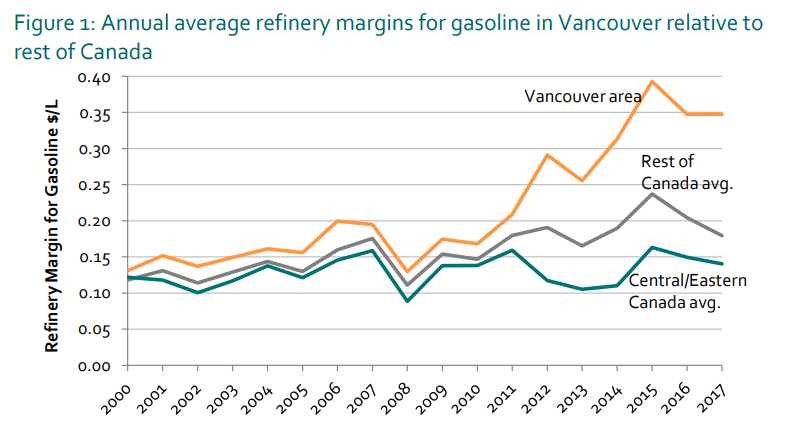As the fuel companies that supply B.C. submit their responses to a provincial gas price inquiry, several are refusing to share key data on their margins.

The B.C. Utilities Commission (BCUC) has been tasked with probing the factors underlying B.C.’s high gas prices and establishing a “common set of facts” about the market.
But in submissions to the BCUC, Suncor Energy, Parkland Fuel Corporation, Husky Energy, Shell Canada and Imperial Oil say they can’t give the regulator details about their margins for reasons of confidentiality and “competitive sensitivity.”
All five companies declined to provide data on their refining margins, while Suncor, Husky and Shell did not answer questions on retail margins — the metric that would illustrate the difference between wholesale and retail prices, after taxes.
WATCH: A brief history of gas prices in B.C.

“We responded to the BCUC questionnaire, however some of the questions involve commercially sensitive information, which we must keep confidential,” Husky Energy spokesperson Kim Guttormson said in an email.
“Under its governing legislation and the inquiry mandate from the B.C. government, the BCUC was unable to provide an appropriate level of confidentiality for the information. We continue to discuss the issue with the BCUC.”
Suncor also raised concerns about the BCUC’s confidentiality process, while Shell Canada said it would not “publicly disclose commercially sensitive and confidential financial information such as retail margins to competitors and other commercial counterparties.”

Get breaking National news
Both 7-11 and Super Save Gas provided details on their retailing margins confidentially to the commission.
It is unclear whether the BCUC will use its power to compel companies to disclose the data.
In an emailed statement, commission chair and CEO David Morton said the regulator is prepared to safeguard any confidential information it receives.
WATCH: Big three gas companies refuse to release information to inquiry

He added that the panel looking into fuel prices will have a chance to ask for further information later in July during Oral Workshops, or could use its legislated powers to compel evidence.
“The BCUC may apply to the court for an order (a) directing the person to comply with the order,” said Morton.
“It is important to note however, that this process could be time consuming, and whether or not this power is utilized would ultimately be at the discretion of the Inquiry Panel.”
Tom Gunton, director of the Resource and Environmental Planning program at Simon Fraser University, said there is no reason for the companies to withhold the data, arguing companies’ margins are actually well known to one another.
He argued that those margins — particularly at the refining level — are driven by a lack of competition in the market and are a key driver of B.C.’s high gas prices.
“One of the issues here is that the oil industry may be a little sensitive about releasing information that confirms what we already seem to know, which is that on an aggregated scale the profit margins at the refinery level are the major reason we have this increase in gas prices, and they’re higher than they should be,” Gunton said.
WATCH: B.C. premier calls for gas prices investigation

Gunton echoed a 2018 study by energy and environment think-tank Navius Research, which found that refining margins for the Vancouver area had “decoupled from supply costs, resulting in high prices that cannot be attributed to competitive market forces or scarcity of supply” in recent years.
According to Gunton, it is unlikely that major producers are outright colluding with each other. But he said because there are so few players in the market, their decisions have an outsized influence on prices at the pump and the companies tend to follow one another’s lead.
“The interesting question is what recommendations the utilities commission is going to make when it reports out in the fall to deal with the situation, which is really due to a lack of adequate competition in the industry,” he said.
The BCUC will begin hearings next week. The regulator has been given until Aug. 30 to conclude its probe.
The terms of reference for the inquiry, however, have faced criticism because they do not empower the BCUC to look at the impacts of government policy or taxes — which amount to more than 50 cents per litre in Metro Vancouver.









Comments